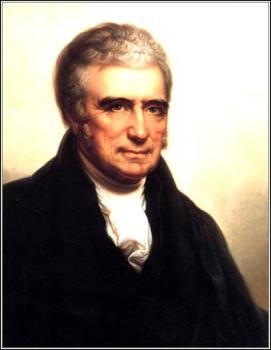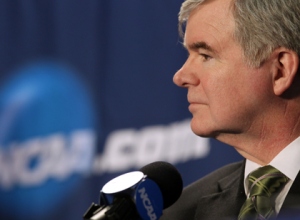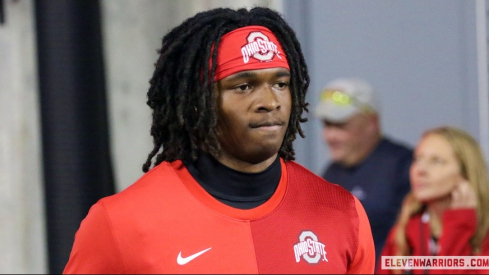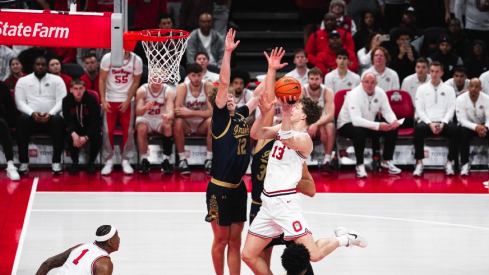 Did what he wanted
Did what he wantedOne of the most important and well-known decisions in Supreme Court history is Marbury v. Madison. For those of you who've forgotten the majority of your 11th grade government class, the story goes something like this:
Right before the John Adams administration peaced out of the presidency in 1801, it made a bunch of judicial appointments as political favors to guys they thought were cool. Adams' Secretary of State was supposed to ensure that all of the letters of commission got delivered, but he screwed up and some of them weren't, including one to a guy named William Marbury. So when the incoming Jefferson administration saw a bunch of appointments for dudes they thought were totally whack, they refused to deliver them.
Marbury, pissed as all hell at this point, took James Madison (Jefferson's Secretary of State) to court. Supreme Court, where Chief Justice John Marshall decided that yes, Marbury had the right the the commission, but the 1789 Judiciary Act that gave the Supreme Court the power to give it to him was unconstitutional so he was SOL.
Oh and PS: John Marshall was the Secretary of State that started this whole mess in the first place and probably should've recused himself but didn't and also didn't really need to say anything about the Judiciary Act but did anyway.
So let's recap: in one fell swoop, John Marshall a) cleaned up his own mess, b) gave the Supreme Court and by extension, himself, the power of judicial review (which didn't exist because it isn't anywhere in the Constitution, iiirroonnnyyy), and c) made Thomas Jefferson really really mad because of a and b. It's considered one of the best judicial decisions in Supreme Court history not because of how sound Marshall's arguments are, but because he brilliantly exploits a situation to give the Court more power than it had before.
NCAA president Mark Emmert has been taking notes.
Today, Emmert and the NCAA levied some severe penalties on Penn State, saying that they were warranted because of the "unprecedented" nature of what happened under the watch of their athletic department. And to be fair, the scope and awfulness of what Jerry Sandusky was allowed to do can't be diminished; he raped children and was allowed to continue to do so because Joe Paterno thought he could be sequestered away like some kind of well-meaning but dangerous Lennie Small instead of being prosecuted and thrown in jail like the monster he is.
But that really isn't what this is about. Neither the NCAA or Emmert can really do anything that will rectify or change what Sandusky did, and nor will their punishments do much to provide comfort to the victims of Sandusky's crimes.
And I think Emmert knows this, which is why they've framed their punishments through the lens of "cultural change:"
By perpetuating a "football first" culture that ultimately enabled serial child sexual abuse to occur, The Pennsylvania State University leadership failed to value and uphold institutional integrity, resulting in a breach of the NCAA constitution and rules.
[Said Emmert,] "...According to the NCAA conclusions and sanctions, the Freeh Report 'presents an unprecedented failure of institutional integrity leading to a culture in which a football program was held in higher esteem than the values of the institution, the values of the NCAA, the values of higher education, and most disturbingly the values of human decency.'"
All true, but what I want to point out is that the NCAA's authority to act as an agent of "cultural change" is a tenuous one at best. For those interested, the NCAA actually does cite bylaw precedent for the actions that they took, but as you read through them it becomes abundantly clear that those bylaws were written with the concept of educational integrity in mind, not criminal proceedings.
 Does what he wants
Does what he wantsHence the John Marshall comparison. Emmert has said that this is a unique case that requires a unique punishment, but in giving himself and the NCAA the power to enact "cultural change," they now have given themselves a wide berth in terms of possible punishments that they can levy and violations that they feel they can address.
Suddenly a spate of arrests at one program might fall under their purview for punishments. Maybe an athlete was found to be selling drugs to his teammates. Maybe several football players are tweeting offensive things and broadcasting it all over the internet. Maybe a booster is taking several players to strip clubs and having boat parties for them.
This is why the University of Miami should be shaking in its boots. By setting this precedent, Emmert and the NCAA is making it clear that explicit violations of NCAA bylaws isn't enough for some problems. If the NCAA feels what had been going on in Miami constitutes a need for a "cultural change," they now have the leeway to give them basically whatever penalty they want.
A lot of people are mad about this. As I write this at 11am on Monday, Andy Staples has been going off on Twitter for the past hour or so about the lack of logic here, and wrote this yesterday. Spencer Hall has referred to the NCAA sanctions on Penn State as "petty tyranny." Our friend Luke Zimmermann threw down 1700 words about what's happened. Hell, even Tim May seems skeptical about everything.
I respect all of those guys, and I get the anger. The NCAA is an obtuse, weird organization that rarely operates on logic or sense, and the Penn State football program is now going to exist in a zombie state for the next decade as it shambles around the Big Ten to serve as a warning for others. It's the functional equivalent of a scarlet letter, an embarrassing way to show the Penn State community at large that their priorities have been misplaced for a long time. It's harsh, harsh stuff, and it's based on powers of authority that Emmert pulled out of thin air in the last few days. That's dangerous.
I have two final thoughts on that. First is that this is the NCAA responding to the biggest criticism we've had of them for a long, long time, which is their relative impotence and weakness. Frustrated because you felt that USC got off easy? Welp!
Secondly, I can't honestly say that I'm mad or sad or think that this punishment is a miscarriage of justice. Is this a slippery slope in terms of what the NCAA is able to do? Yeah, it is. But the culture at Penn State does need to change, and though it's unlikely that the NCAA sanctions will actually do anything to affect that, I don't really mind watching them try.
Still, let's not pretend that Ohio State fans and administration (or Michigan fans and administration, or Texas fans and administration, or LSU fans and administration) are somehow immune to the kind of blind support and sheer stupidity we've seen out of Happy Valley. All of us are guilty of putting sports before education, loyalty before sense, and pride before acceptance; some people even wear that fact as a badge of honor.
So maybe part of the anger that comes from this decision is because we all know that on some level we're vulnerable and in need of the same kind of "cultural change" that Penn State needs right now.
Is our kind of fanaticism on the same level of what happened and to some extent is still happening at PSU? God, I hope not, and I doubt it.
But I'm not sure.

